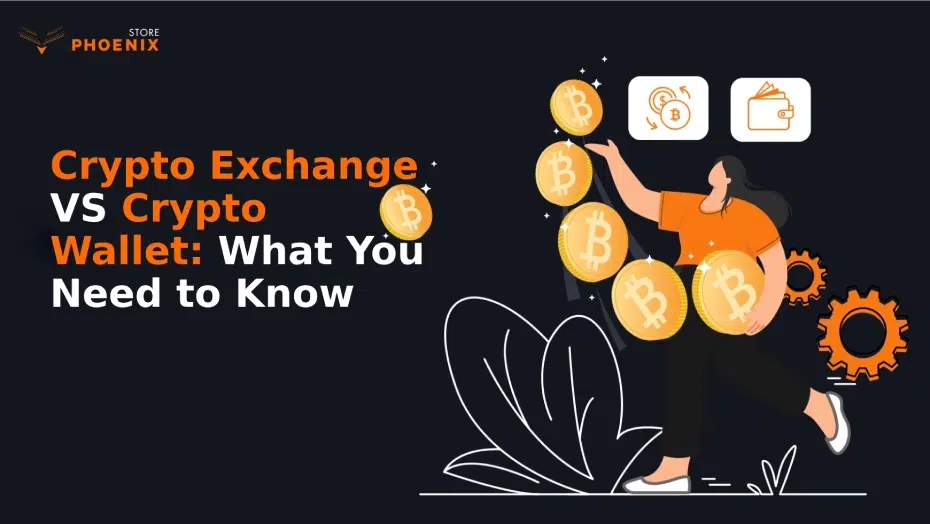Crypto Exchange vs Crypto Wallet: What you Need to Know

When navigating the world of cryptocurrency, one of the first questions you’ll encounter is: crypto exchange vs crypto wallet – which one should you use? While exchanges allow for quick trading and easy access to various assets, wallets offer a secure way to store and manage your crypto. Understanding the key differences and knowing when to use each is essential for protecting your investments and making the most of your crypto journey. In this guide, we’ll walk you through what you need to know.
What is a Crypto Exchange?
A crypto exchange is an online platform that allows users to buy, sell, and trade cryptocurrencies like Bitcoin, Ethereum, and others. These platforms often act as intermediaries, holding your funds while facilitating transactions.
Key Features:
Crypto exchanges typically offer market charts, trading pairs, real-time pricing, and tools for buying or selling crypto with fiat currencies or other digital assets.
Advantages:
- Easy access to a wide range of cryptocurrencies
- Fast and convenient for trading and converting assets
- Often includes features like staking, margin trading, or advanced analytics
Disadvantages:
- Users don’t have full control over their private keys
- Exchanges are prime targets for hackers
- Funds may be frozen or restricted by platform policies
What is a Crypto Wallet?
A crypto wallet is a tool that allows you to store, manage, and transfer cryptocurrencies. Unlike exchanges, wallets give you full control over your private keys—meaning full ownership of your crypto assets.
Types of Cryptocurrency Wallets:
- Hot wallets (e.g., mobile apps, browser extensions) are connected to the internet and ideal for quick, day-to-day access.
- Cold wallets (e.g., hardware wallets like Ledger or Trezor) store assets offline, offering much stronger protection against hacks. For those serious about security, investing in a hardware wallet is one of the best ways to keep your crypto safe long-term.
Key Features:
Crypto wallets let you send and receive assets, view balances, generate new addresses, and in some cases, interact with decentralized apps (dApps).
Advantages:
- Full control over your funds and private keys
- Enhanced security, especially with cold wallets
- Not dependent on third-party platforms
Disadvantages:
- More responsibility – if you lose access, recovery may be impossible
- Some wallets may have a steeper learning curve
- Cold wallets require additional setup and physical storage
Read more: How to send Bitcoin to another wallet?
Major Differences Between Crypto Exchanges and Wallets
When comparing a crypto exchange vs crypto wallet, it’s important to understand how each serves a different purpose in managing and securing your digital assets. Here’s how they differ across key aspects:
1- Ownership and Control of Assets
Crypto exchanges hold your assets on your behalf. This means they control the private keys, and you rely on their platform to access your funds. In contrast, wallets—especially self-custodial or hardware wallets – give you full ownership by storing private keys locally, granting total control over your crypto.
2- Ease of Use for Beginners
Exchanges are generally more beginner-friendly. Their interfaces are designed for ease of trading, buying, and selling in just a few clicks. Wallets may require more technical knowledge, especially when dealing with private keys, seed phrases, or connecting to networks manually.
3- Transaction Speeds and Limits
On exchanges, transactions between accounts can be instant but are often subject to daily withdrawal limits. Wallet-to-wallet transfers on the blockchain depend on network congestion and can take several minutes or more. However, there are no platform-imposed limits when using your own wallet.
4- Security Considerations
Exchanges are more exposed to hacks and breaches since they hold large amounts of user funds in centralized storage. Wallets, especially cold wallets, reduce this risk by keeping private keys offline. The trade-off is that wallet users must take full responsibility for their own security.
5- Cost Implications
While using an exchange may involve trading fees, spreads, and withdrawal charges, using a crypto wallet typically only involves network fees. There’s an initial cost to buying a hardware wallet, but long-term, it can save money by giving you full control over transactions without platform fees.
6- Regulatory Considerations
Exchanges are usually regulated and may require KYC (Know Your Customer) verification, making them more compliant with government policies. Wallets, especially self-custodial ones, don’t require identity verification and offer more privacy—but with that comes more personal responsibility.
Use Cases: Choosing the Right Tool for Your Needs
Depending on how you use your crypto, one option may serve you better than the other—or you might even need both. Here’s how to decide:
- Active Trading: If you’re buying and selling crypto frequently, a crypto exchange is often more suitable. It provides quick access to markets, liquidity, and advanced tools for tracking price movements and executing trades.
- Long-Term Holding: For storing crypto over months or years, a secure wallet is the safer choice. You retain full control over your assets and eliminate reliance on third-party platforms. Hardware wallets like Ledger Nano s and Ledger Nano x offer industry-leading protection, especially for large holdings.
- Everyday Transactions and Payments: Mobile or desktop wallets are ideal for daily use. They allow quick access to your funds and support common features like QR scanning, contact lists, and fee adjustments to suit different types of payments.
- Staking and Yield Farming: Both exchanges and wallets can support staking or DeFi-based earning. Exchanges simplify the process but usually take a cut. Non-custodial wallets allow you to connect directly with staking protocols or yield platforms, giving you more control over your rewards.
- Interacting with Decentralized Applications (dApps) and DeFi: If you’re engaging with dApps or DeFi platforms, you’ll need a non-custodial wallet that supports Web3 connectivity. Browser extensions and mobile wallets are common here, but for added security, hardware wallets like Ledger can be integrated for signing transactions securely.
Phoenix Store Helps You Buy the Right Crypto Wallets
Choosing the right wallet doesn’t have to be complicated. At Phoenix Store, you’ll find a range of secure and reliable crypto wallets suited for beginners, active users, and long-term holders alike. From hardware wallets offering top-tier security like Ledger and Trezor to convenient card-style options such as Tangem
and sleek mobile-connected devices like CoolWallet, we make it easy to compare, choose, and buy with confidence – backed by fast shipping and responsive customer support.
Final Thoughts: Crypto Wallet vs Exchange
When it comes to crypto wallet vs exchange, the best choice depends on how you use your crypto. Exchanges are great for trading and convenience, while wallets offer better security and control. Many users benefit from using both – trading on exchanges and then transferring assets to a secure wallet for storage. The key is knowing when and how to use each one to match your goals.
 Immersion Cooling for Bitcoin Mining: Pros and Cons
Immersion Cooling for Bitcoin Mining: Pros and Cons
 »
»